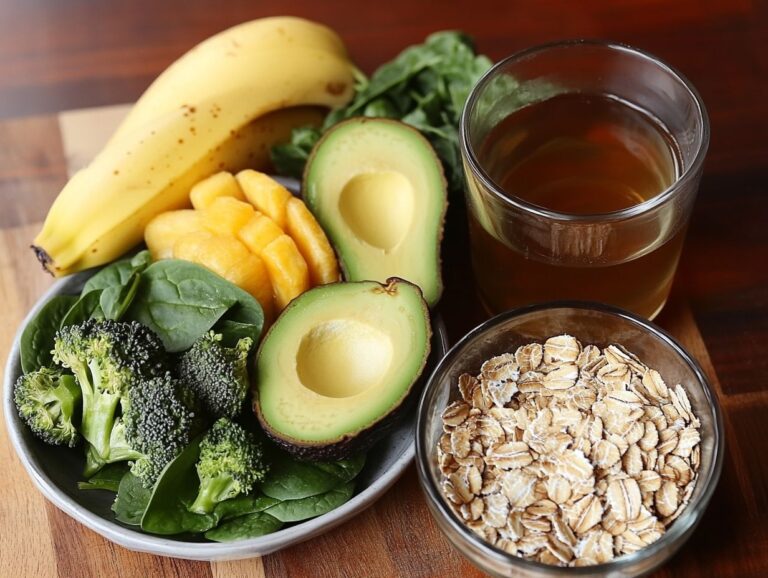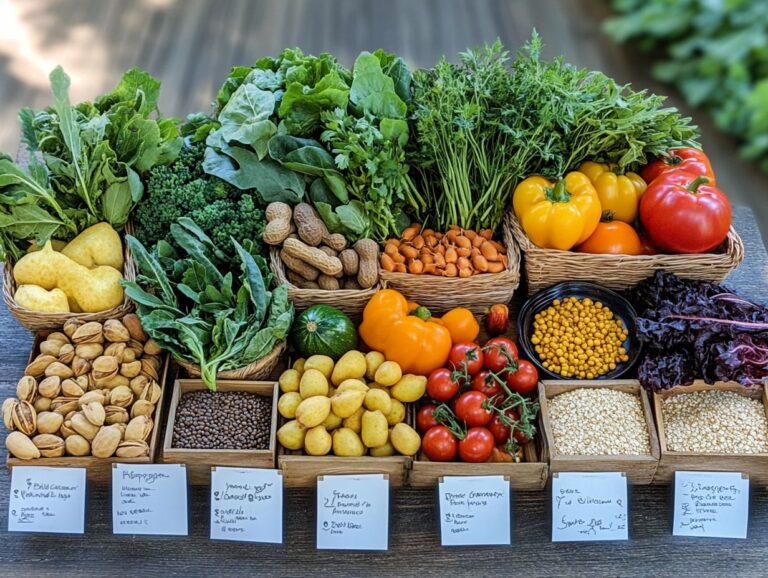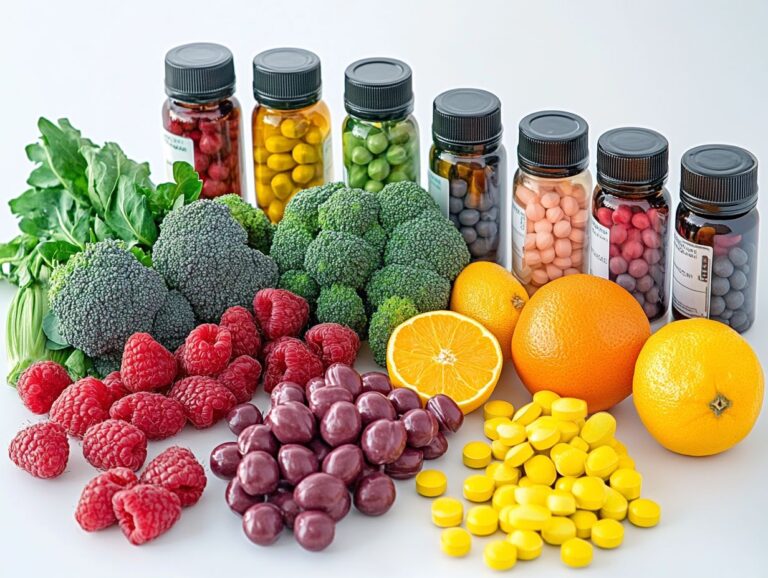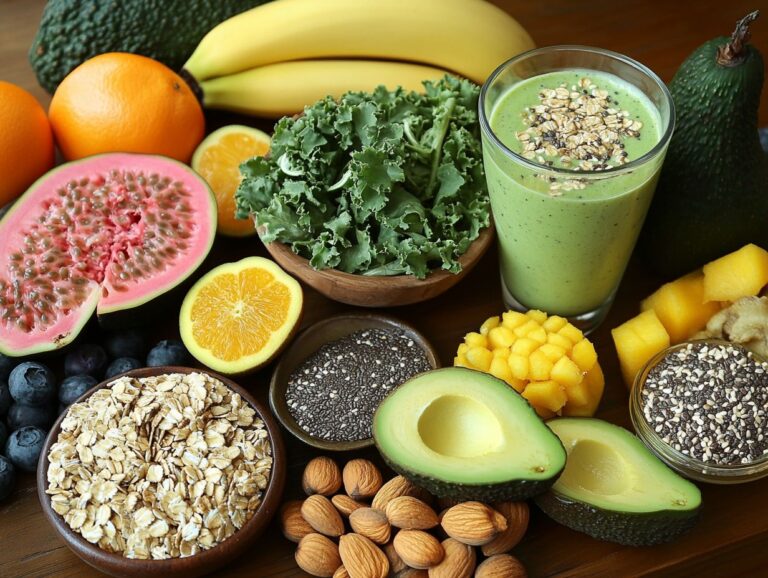Curious about how a vegan diet impacts your dental health? While embracing plant-based eating is increasingly popular for its numerous health benefits, including oral health, it’s essential to understand how it affects your teeth. This article explores the nuances of a vegan diet, its advantages, and potential challenges for dental health, including nutrient deficiencies and sources of calcium. Discover how to maintain strong, healthy teeth by focusing on key mineral sources, like calcium and vitamin D, necessary dietary adjustments, and practical tips for optimal oral hygiene. Your smile deserves it!
Key Takeaways:
- A vegan diet can provide many benefits for overall health and dental health, but it’s important to carefully plan for key minerals like calcium, phosphorus, and zinc.
- Leafy greens, such as collard greens and spinach, nuts and seeds like almonds and pumpkin seeds, fortified plant milks, and sea vegetables are great sources of minerals for dental health on a vegan diet.
- To maintain good dental health while on a vegan diet, it’s important to limit acidic fruits and juices, sugary foods and drinks, and to practice proper oral hygiene and get regular dental check-ups.
What Is a Vegan Diet?
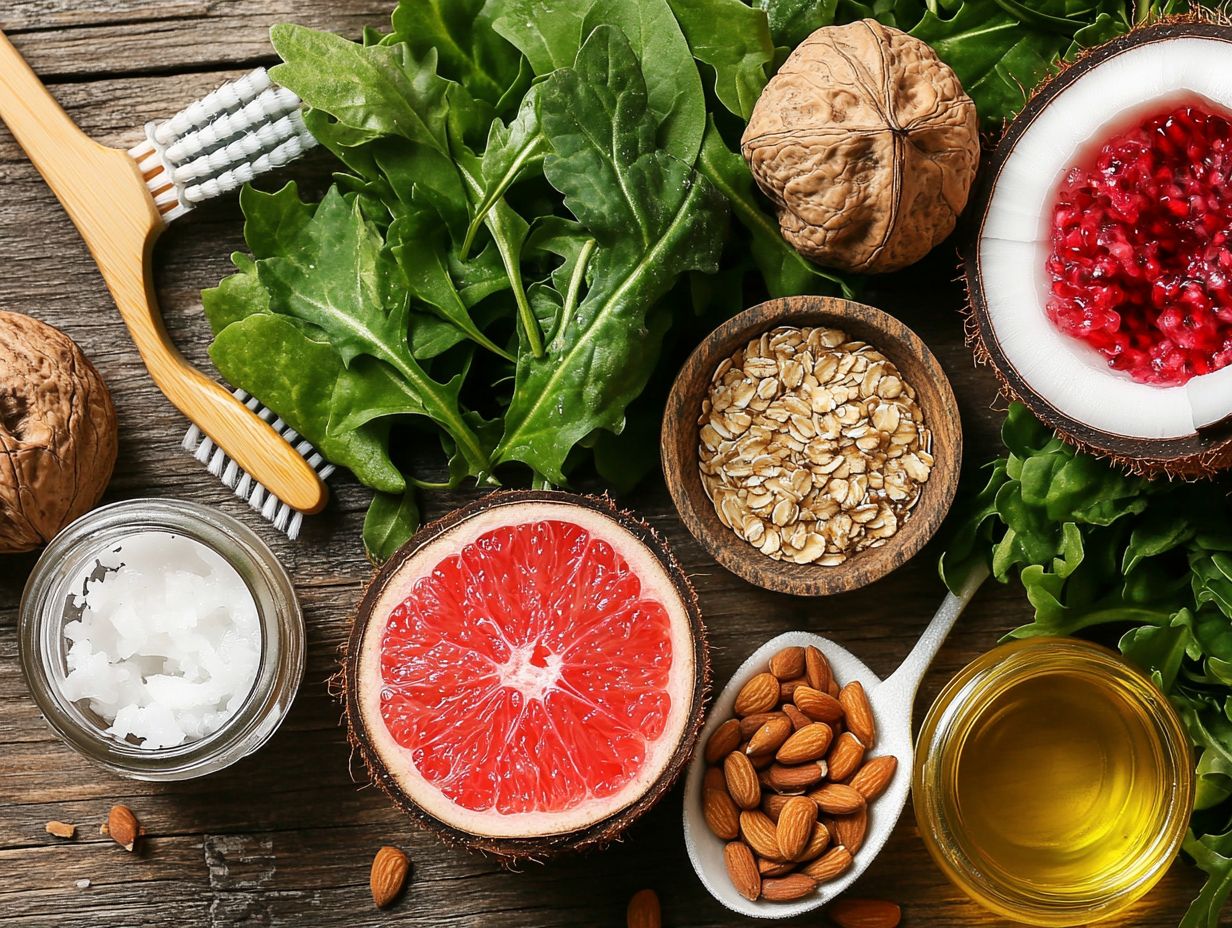 A vegan diet is a plant-based diet that excludes all animal products, including meat, dairy, and eggs. Individuals who follow a vegan diet consume a varied and balanced selection of plant foods, which includes fruits, vegetables, grains, legumes, nuts, and seeds. This diet emphasizes the ethical treatment of animals and is promoted for both health and environmental reasons. However, adhering to a vegan diet requires careful attention to nutrient intake to avoid deficiencies in essential components such as vitamin B12 and calcium, which are critical for maintaining good health and well-being.
A vegan diet is a plant-based diet that excludes all animal products, including meat, dairy, and eggs. Individuals who follow a vegan diet consume a varied and balanced selection of plant foods, which includes fruits, vegetables, grains, legumes, nuts, and seeds. This diet emphasizes the ethical treatment of animals and is promoted for both health and environmental reasons. However, adhering to a vegan diet requires careful attention to nutrient intake to avoid deficiencies in essential components such as vitamin B12 and calcium, which are critical for maintaining good health and well-being.
What Are the Benefits of a Vegan Diet?
A vegan diet offers numerous benefits that extend beyond ethical considerations, including significant health advantages such as improved oral health and enhanced overall nutrition. Research indicates that a vegan diet can contribute to healthy teeth and gums by reducing the risk of gum disease and promoting better dental health. According to the American Dental Association, a well-planned vegan diet based primarily on whole foods, including fresh fruits, broccoli, and carrots, provides a variety of essential vitamins and minerals necessary for a healthy lifestyle. Along with promoting overall nutrition, a vegan diet is associated with effective weight control. Plant-based foods are often lower in calories and high in fiber, which helps individuals feel full without consuming the excess calories typically found in many animal-based foods. Furthermore, adopting a vegan lifestyle is linked to a reduced risk of chronic diseases such as heart disease, type 2 diabetes, and certain cancers, thanks to lower saturated fat intake and higher consumption of antioxidants. To enhance overall well-being, nutrition tips for a vegan diet can help ensure that essential nutrients, such as protein, iron, and vitamin B12, are adequately included in meals.
How Does a Vegan Diet Affect Dental Health?
The impact of a vegan diet on dental health is a significant consideration for individuals adopting this lifestyle, as it can influence oral health both positively and negatively. A plant-based diet that includes a variety of fruits and vegetables offers essential nutrients that promote healthy teeth; however, it may also lead to specific nutrient deficiencies that can adversely affect dental health. Key vitamins and minerals, including calcium and vitamin B12, play a crucial role in maintaining strong teeth and preventing gum disease, making proper dietary planning essential.
Does a Vegan Diet Lead to Mineral Deficiencies in Teeth?
A vegan diet can lead to mineral deficiencies that may result in various dental problems, especially if it is not properly planned. Essential minerals such as calcium and vitamin B12 are crucial for maintaining strong teeth and bones; their absence in a vegan diet can increase the risk of dental complications. Therefore, individuals following a vegan lifestyle must seek alternative sources of these nutrients, such as fortified foods or supplements, to ensure both dental and overall health. Calcium plays an essential role in providing structure to teeth, helping to prevent cavities and maintain enamel strength. Vegans can find alternative sources of calcium in various plant-based options, including:
- Leafy greens
- Almonds
- Fortified plant milks
On the other hand, vitamin B12 is often overlooked, as it is primarily found in animal products. However, it can be effectively replaced by consuming fortified cereals and nutritional yeast. It is important for vegans to regularly monitor their nutrient intake, as deficiencies in these minerals can lead to dental issues as well as broader health problems. This underscores the clear connection between diet and dental health.
Can a Vegan Diet Cause Tooth Decay?
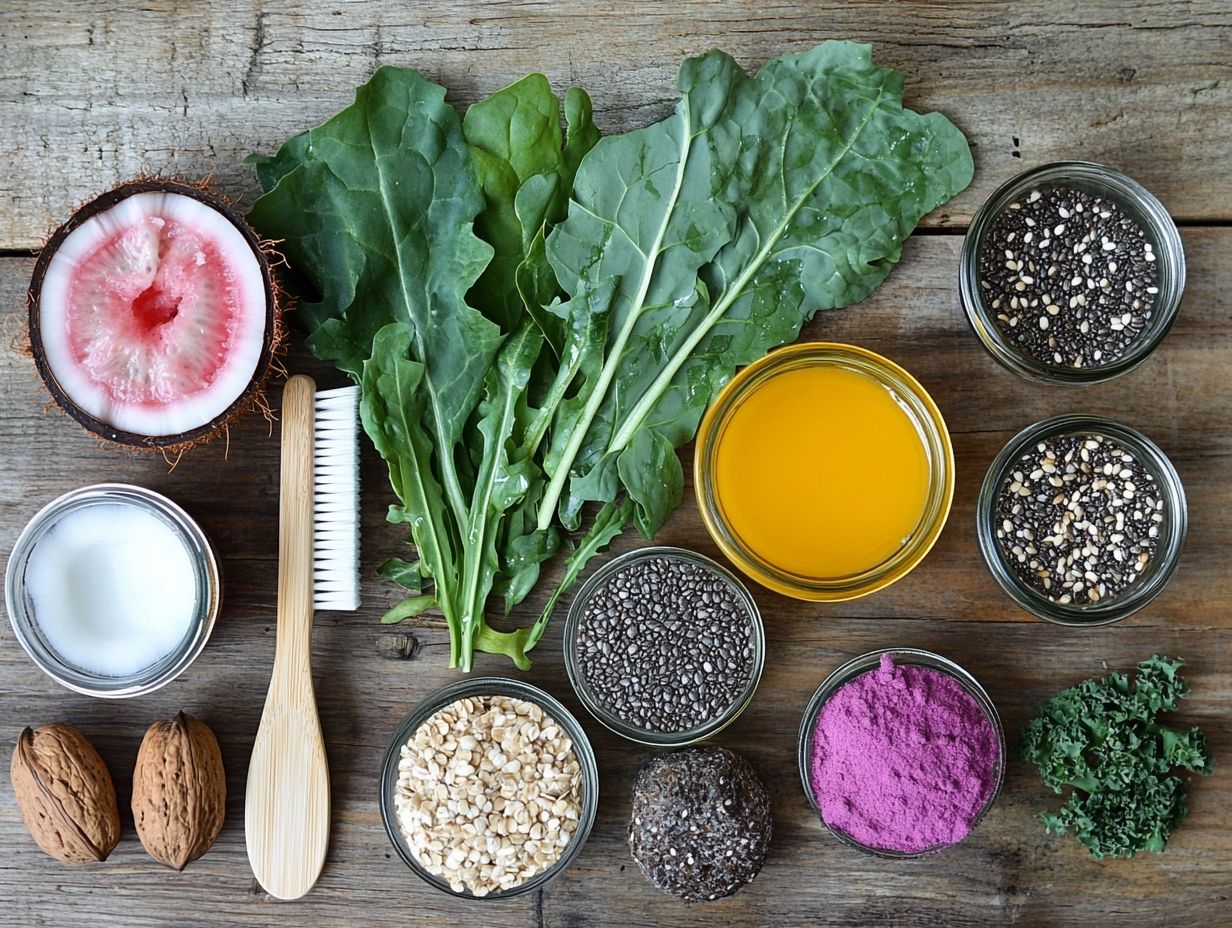 A vegan diet can offer numerous health benefits; however, if not accompanied by proper oral hygiene and an awareness of dietary impacts, it may lead to tooth decay. Individuals following plant-based diets should recognize how their food choices affect their dental health. Sugary foods, such as dried fruits and sweetened plant-based snacks, can stick to teeth and promote plaque buildup, resulting in tooth decay. Additionally, many plant-based options can be acidic, contributing to enamel erosion over time and exacerbating these effects. To mitigate these negative impacts, it is essential for those adopting a vegan lifestyle to focus on consuming whole and unprocessed foods, as well as to have regular visits with dental healthcare providers. By gaining a better understanding of the connection between diet, oral hygiene, and tooth health, individuals can make more informed decisions.
A vegan diet can offer numerous health benefits; however, if not accompanied by proper oral hygiene and an awareness of dietary impacts, it may lead to tooth decay. Individuals following plant-based diets should recognize how their food choices affect their dental health. Sugary foods, such as dried fruits and sweetened plant-based snacks, can stick to teeth and promote plaque buildup, resulting in tooth decay. Additionally, many plant-based options can be acidic, contributing to enamel erosion over time and exacerbating these effects. To mitigate these negative impacts, it is essential for those adopting a vegan lifestyle to focus on consuming whole and unprocessed foods, as well as to have regular visits with dental healthcare providers. By gaining a better understanding of the connection between diet, oral hygiene, and tooth health, individuals can make more informed decisions.
What Are the Best Sources of Minerals for Dental Health on a Vegan Diet?
Identifying the best sources of minerals is essential for maintaining dental health on a vegan diet, as certain plant-based foods provide the necessary nutrients for strong teeth and overall oral health. Leafy greens such as collard greens and spinach, along with nuts and seeds like almonds and pumpkin seeds, are rich in calcium sources and other vital minerals. Additionally, fortified plant milks and sea vegetables serve as alternative sources of vitamin B12, helping vegans maintain optimal nutrient levels.
1. Leafy Greens
Leafy greens, such as collard greens and spinach, are excellent sources of calcium sources and other essential nutrients that contribute to healthy teeth and bones. Their high fiber content also promotes oral health by stimulating saliva production, which helps neutralize acids in the mouth. This is particularly important for individuals on a vegan diet, as they need to find alternative calcium sources to maintain strong teeth. Incorporating these nutrient-dense greens into the diet not only helps individuals meet their daily calcium requirements but also provides vital vitamins, such as K and A, that support oral health. Additionally, the antioxidants found in leafy greens can reduce inflammation and lower the risk of developing gum disease, helping to keep the mouth healthy and free from harmful bacteria. Focusing on these types of plant-based foods leads to nutritious and delicious meals, contributing to bright smiles.
2. Nuts and Seeds
Nuts and seeds, such as almonds and pumpkin seeds, are vital components of a vegan diet and excellent sources of calcium. They provide essential minerals necessary for maintaining healthy teeth in various ways. These nutrient-dense snacks can help prevent nutrient deficiencies in individuals who follow strict eating regimens or struggle to obtain enough essential nutrients in their diets, as they are high in calories and protein. Foods rich in healthy fats, protein, and vital vitamins contribute to strengthening enamel and promoting gum health. For example, almonds are renowned for their high calcium content, which supports jawbone density, while pumpkin seeds are rich in magnesium, an important mineral for overall bone mineralization. Ensuring a balanced intake of various nuts and seeds each day promotes good oral health. Additionally, they provide antioxidants that help reduce inflammation and enhance the body’s ability to combat germs.
3. Fortified Plant Milks
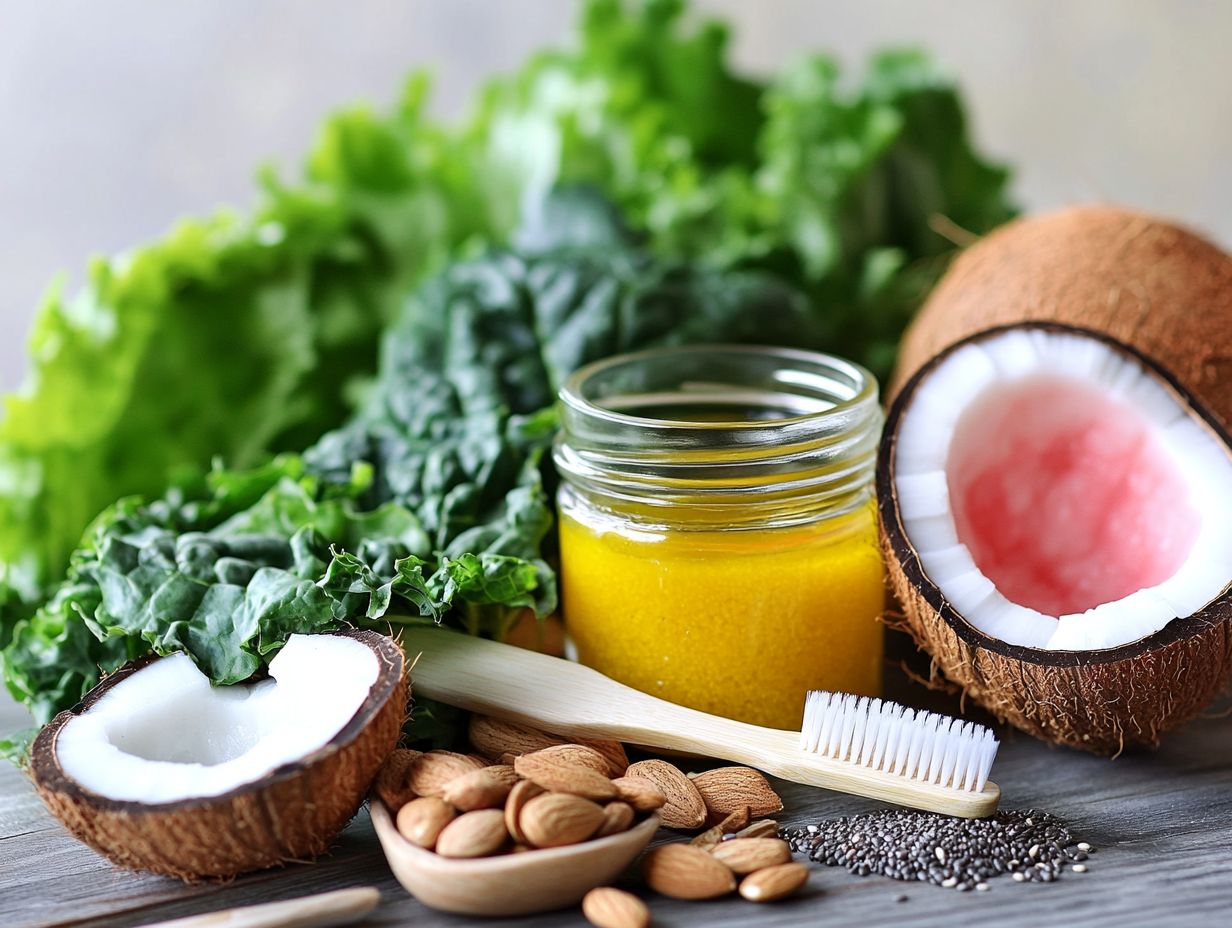 Fortified plant milks play a crucial role in supplying essential nutrients, such as calcium and vitamin B12, which are often limited in a strict vegan diet. Plant milk alternatives, including almond milk and soy products, not only contribute to improved dental health but also assist in meeting general nutritional needs. With the introduction of options like oat milk and rice milk, individuals following a vegan diet have convenient access to these fortified beverages. Many of these plant milks are enriched with calcium to support strong bones and teeth, as well as vitamin B12 to address a common deficiency among those who do not consume animal products. Regular consumption of fortified plant milks is known to enhance dental health by aiding in the remineralization of tooth enamel.
Fortified plant milks play a crucial role in supplying essential nutrients, such as calcium and vitamin B12, which are often limited in a strict vegan diet. Plant milk alternatives, including almond milk and soy products, not only contribute to improved dental health but also assist in meeting general nutritional needs. With the introduction of options like oat milk and rice milk, individuals following a vegan diet have convenient access to these fortified beverages. Many of these plant milks are enriched with calcium to support strong bones and teeth, as well as vitamin B12 to address a common deficiency among those who do not consume animal products. Regular consumption of fortified plant milks is known to enhance dental health by aiding in the remineralization of tooth enamel.
4. Sea Vegetables
Sea vegetables, such as nori and kelp, are often overlooked yet provide valuable additions to a vegan diet. They offer essential minerals and serve as a natural source of vitamin B12, which is crucial for dental health. Their unique nutrient profile can help prevent deficiencies commonly associated with a plant-based lifestyle. Incorporating these nutrient-dense ingredients, including vitamin B12 and vitamin D, can significantly enhance overall health, as they are rich in iodine, calcium, and iron all vital for maintaining energy levels and supporting the body’s metabolic functions. Additionally, consuming these marine plants can increase antioxidant intake, which plays a pivotal role in protecting against oxidative stress and supporting a healthy mouth. For those following a vegan diet, sea vegetables also serve as a sustainable alternative to conventional sources of essential nutrients, making them a smart choice for anyone looking to optimize their nutrition with vegan milk and enjoy a diverse range of flavors and textures in their meals.
5. Supplements
Supplements can be essential for individuals following a vegan diet, particularly for ensuring adequate intake of vitamin B12, vitamin D, and calcium. By supplementing a vegan diet, individuals can reduce the likelihood of deficiencies and enhance overall dental health. Many people who adopt a vegan lifestyle may not realize they are not obtaining enough essential nutrients, as plant-based diets often lack natural sources of B12, which is primarily found in animal products. Calcium, vital for bone strength and muscle function, is frequently consumed in insufficient amounts without dairy, making supplements crucial. Those considering supplementation should seek guidance from healthcare professionals, who can provide tailored advice and monitoring to ensure that the chosen supplements align with individual health needs and dietary plans.
What Foods Should Be Limited on a Vegan Diet for Dental Health?
The most important aspect to understand about vegan diets and dental health is that, although they offer numerous benefits, certain foods like starch and acidic foods should be restricted to ensure the diet remains healthy for the teeth. Acidic fruits and sugary foods can lead to tooth decay and enamel erosion, so vegans should be mindful of their snack choices. Additionally, maintaining proper oral hygiene is essential for preserving a healthy mouth.
1. Acidic Fruits and Juices
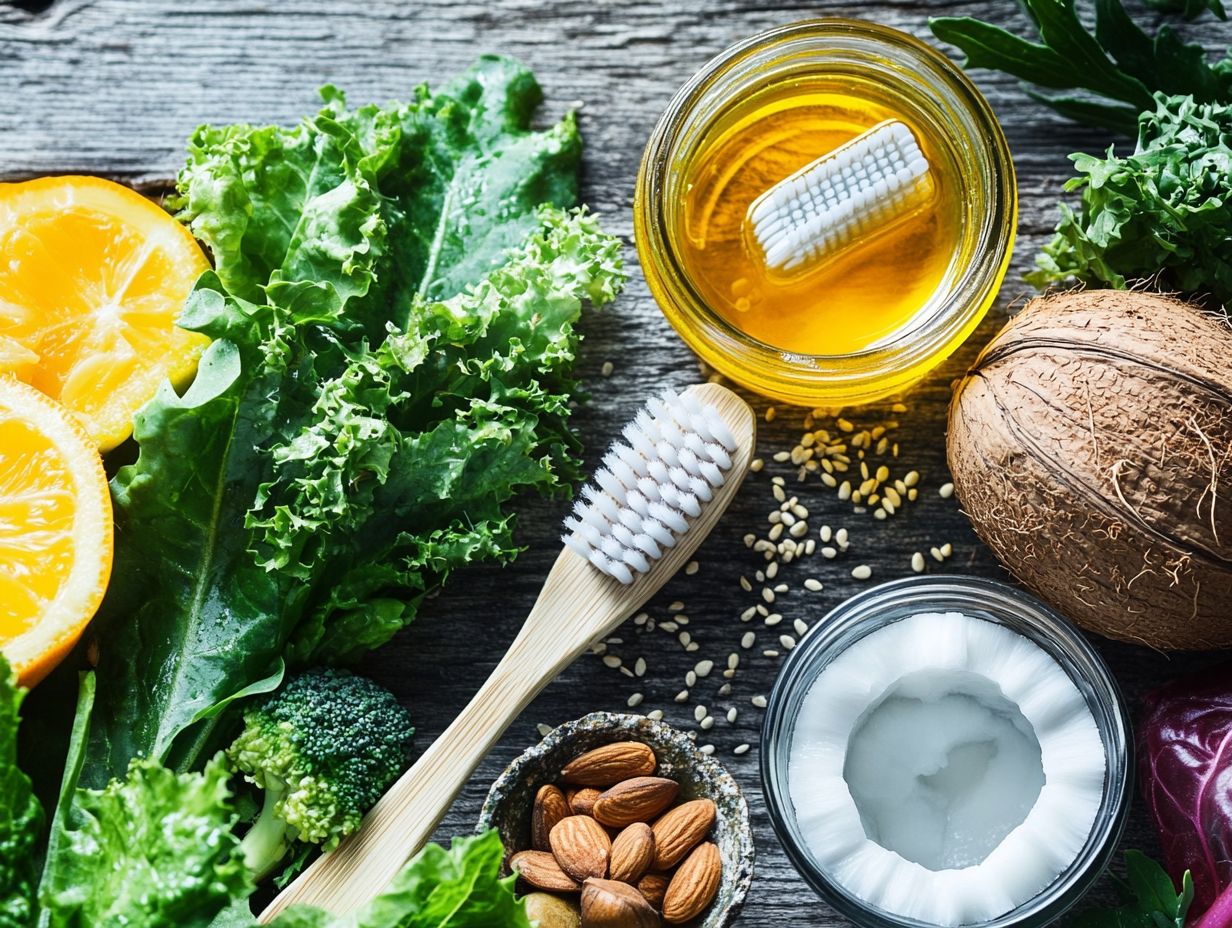 Acidic fruits, such as lemons and grapefruits, can pose a risk to dental health due to their high acidity, which can erode tooth enamel over time. While these fruits are nutritious, moderation is essential, and proper oral hygiene practices should be followed after consumption to mitigate potential damage. This risk can be particularly significant for individuals following a vegan diet, as they may depend heavily on these fruits for their vitamin C and antioxidant content. Regular exposure to the acids in these foods can lead to increased tooth sensitivity and cavities if dental care is neglected. To maintain a balance, it is advisable to:
Acidic fruits, such as lemons and grapefruits, can pose a risk to dental health due to their high acidity, which can erode tooth enamel over time. While these fruits are nutritious, moderation is essential, and proper oral hygiene practices should be followed after consumption to mitigate potential damage. This risk can be particularly significant for individuals following a vegan diet, as they may depend heavily on these fruits for their vitamin C and antioxidant content. Regular exposure to the acids in these foods can lead to increased tooth sensitivity and cavities if dental care is neglected. To maintain a balance, it is advisable to:
- Rinse the mouth with water after consuming these fruits.
- Wait at least 30 minutes before brushing teeth to prevent further enamel erosion.
- Consider using a straw to limit acid contact with teeth.
Additionally, incorporating calcium-rich, non-acidic foods can help strengthen enamel while maintaining a balanced diet.
2. Sugary Foods and Drinks
Sugary foods and drinks, even those that are plant-based, can significantly harm teeth and overall oral health. To protect their oral health and promote good dental hygiene practices, individuals following a plant-based diet should restrict their intake of sugary foods and beverages, especially during frequent snacking. There is a common misconception that all sweets made with plant-based ingredients are healthy; however, many of these products still contain high levels of natural sugar, which can lead to plaque buildup and other dental issues if consumed in excess. Vegans need to be mindful of their food choices when adopting a plant-based diet by opting for whole foods and balancing their occasional consumption of sugary plant-based treats with nutrient-rich options. Additionally, maintaining a consistent oral hygiene routine is essential to minimize the effects of sugar on dental health, making regular brushing and flossing crucial. Incorporating fluoride alternatives, such as certain herbal mouth rinses, can also help strengthen enamel and contribute to a bright and strong smile.
What Are Other Ways to Promote Dental Health on a Vegan Diet?
Holistic strategies for promoting dental health on a vegan diet include oil pulling, consuming remineralizing foods, maintaining proper oral hygiene, and scheduling regular dental check-ups. These practices are essential for ensuring that a vegan lifestyle supports optimal dental health.
1. Oil Pulling
Oil pulling is an ancient practice that involves swishing oil in the mouth to help remove toxins and promote oral health, making it a beneficial complement to a vegan diet. It is often paired with the consumption of healthy snacks that are free from starch to further support dental health. This simple technique reduces plaque buildup and enhances overall oral hygiene, leading to a healthier mouth. Typically, cold-pressed oils such as coconut and sesame are used, which not only provide soothing benefits but also align with vegan principles. Swishing oil for about 15-20 minutes allows beneficial compounds to bind with bacteria and other toxins, effectively drawing them out of the mouth. This process helps reduce the risk of issues like gum disease and bad breath. Additionally, oil pulling can accelerate natural teeth whitening and support the overall health of the gums. This practice aligns seamlessly with a vegan lifestyle, as it is a natural and cruelty-free approach to health.
2. Proper Oral Hygiene
To maintain dental health, it is essential to practice proper oral hygiene, particularly for individuals on a vegan diet, who may be at risk for specific nutrient deficiencies. Regular brushing, flossing, and using mouthwash are crucial for preventing tooth decay and gum disease, ensuring a healthy mouth. It is important to choose plant-based oral care products that do not contain harmful additives and to incorporate foods rich in vitamin A and amino acids. Additionally, consuming foods rich in calcium, vitamin D, and vitamin B12 is vital for those following a vegan lifestyle, as these nutrients are key to building strong teeth and maintaining healthy gums. Staying hydrated by drinking enough water and limiting sugary snacks can further reduce the risk of cavities. Regular visits to the dentist are important for early detection of any potential issues. An effective oral hygiene regimen not only contributes to a bright smile but also supports overall health for those on a vegan diet.
3. Regular Dental Check-ups
The importance of regular dental check-ups in maintaining dental health cannot be overstated, particularly for those following a vegan diet. One of the main advantages of these check-ups is the ability to monitor and professionally evaluate oral health, allowing for the detection and resolution of issues before they worsen. Individuals on a plant-based diet should be aware of how various dietary choices can impact their oral health during these visits. While dental professionals from clinics like Westlake Dental Associates and Soft Touch Dentistry will assess the condition of the teeth and gums, they will also provide personalized recommendations tailored to a vegan diet. This may include advice on essential vitamins and minerals necessary for strong teeth and healthy gums, such as calcium and vitamin B12. Along with offering general oral hygiene recommendations, dental professionals can identify early warning signs of potential deficiencies or imbalances in oral health and may suggest preventative measures, such as fluoride treatments or dietary adjustments.

